|
Most Serious Economic Crisis in Modern History
The October 2008 financial meltdown is not the result of a
cyclical economic phenomenon. It is the deliberate result of US
government policy instrumented through the Treasury and the US
Federal Reserve Board.
This is the most serious economic crisis in World history.
The "bailout" proposed by the US Treasury does not constitute a
"solution" to the crisis. In fact quite the opposite: it is the
cause of further collapse. It triggers an unprecedented
concentration of wealth, which in turn contributes to widening
economic and social inequalities both within and between
nations.
The levels of indebtedness have skyrocketed. Industrial
corporations are driven into bankruptcy, taken over by the
global financial institutions. Credit, namely the supply of
loanable funds, which constitutes the lifeline of production
and investment, is controlled by a handful of financial
conglomerates.
With the "bailout", the public debt has spiraled. America is the
most indebted country on earth. Prior to the "bailout", the US
public debt was of the order of 10 trillion dollars. This US
dollar denominated debt is composed of outstanding treasury
bills and government bonds held by individuals, foreign
governments, corporations and financial institutions.
"The Bailout": The US Administration is Financing its Own
Indebtedness
Ironically, the Wall Street banks --which are the recipients of
the bailout money-- are also the brokers and underwriters of the
US public debt. Although the banks hold only a portion of the
public debt, they transact and trade in US dollar denominated
public debt instruments Worldwide.
In a bitter twist, the banks are the recipients of a 700+
billion dollar handout and at the same time they act as
creditors of the US government.
We are dealing with an absurd circular relationship: To finance
the bailout, Washington must borrow from the banks, which are
the recipients of the bailout.
The US administration is financing its own indebtedness.
Federal, State and municipal governments are increasingly in a
straightjacket, under the tight control of the global financial
conglomerates. Increasingly, the creditors call the shots on
government reform.
The bailout is conducive to the consolidation and a
centralization of banking power, which in turn backlashes on
real economic activity, leading to a string of bankruptcies and
mass unemployment.
Will an Obama Administration Reverse the Tide?
The financial crisis is the outcome of a deregulated financial
architecture.
Obama has stated unequivocally his resolve to address the policy
failures of the Bush administration and "democratize" the US
financial system. President-Elect Barack Obama says that he is
committed to reversing the tide:
"Let us remember that if this financial crisis taught us
anything, it’s that we cannot have a thriving Wall Street
while Main Street suffers. In this country, we rise or fall
as one nation, as one people." (President-elect Barack Obama,
November 4, 2008, emphasis added)
The Democrats casually blame the Bush administration for the
October financial meltdown.
Obama says that he will be introducing an entirely
different policy agenda which responds to the interests of Main
Street:
"Tomorrow, you can turn the page on policies that put the
greed and irresponsibility of Wall Street before the hard
work and sacrifice of men and women all across Main Street.
Tomorrow you can choose policies that invest in our middle class
and create new jobs and grow this economy so that everybody has
a chance to succeed, from the CEO to the secretary and the
janitor, from the factory owner to the men and women who work on
the factory floor.( Barack Obama, election campaign, November 3,
2008, emphasis added)
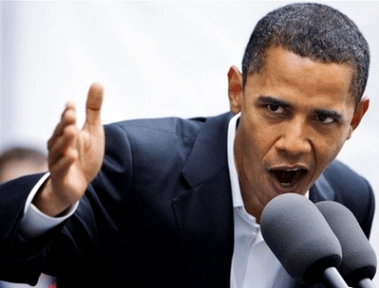
Is Obama committed to "taming Wall Street" and "disarming
financial markets"?
Ironically, it was under the Clinton administration that these
policies of "greed and irresponsibility" were adopted.
The 1999 Financial Services Modernization Act (FSMA) was
conducive to the the repeal of the Glass-Steagall Act of 1933. A
pillar of President Roosevelt’s "New Deal", the Glass-Steagall
Act was put in place in response to the climate of corruption,
financial manipulation and "insider trading" which resulted in
more than 5,000 bank failures in the years following the 1929
Wall Street crash.
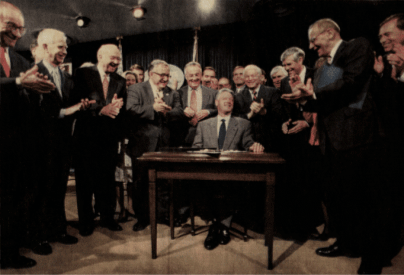
Bill Clinton signs into law the Gramm-Leach-Bliley Financial
Services Modernization Act, November 12, 1999
Under the 1999 Financial Services Modernization Act, effective
control over the entire US financial services industry
(including insurance companies, pension funds, securities
companies, etc.) had been transferred to a handful of financial
conglomerates and their associated hedge funds.
The Engineers of Financial Disaster
Who are the architects of this debacle?
In a bitter irony, the engineers of financial disaster are now
being considered by President-Elect Barack Obama's Transition
Team for the position Treasury Secretary:
Lawrence Summers
played a key role in lobbying Congress for the repeal of
the Glass
Steagall Act.
His timely appointment by President Clinton in 1999 as Treasury
Secretary spearheaded the adoption of the Financial Services
Modernization Act in November 1999. Upon completing his mandate
at the helm of the US Treasury, he became president of Harvard
University (2001- 2006).
Paul Volker was
chairman of the Federal Reserve Board in the l980s during the
Reagan era. He played a central role in implementing the first
stage of financial deregulation, which was conducive to mass
bankruptcies, mergers and acquisitions, leading up to the 1987
financial crisis.
Timothy Geithner
is CEO of the Federal Reserve Bank of New York, which is the
most powerful private financial institution in America. He was
also a former Clinton administration Treasury official. He has
worked for Kissinger Associates and has also held a senior
position at the IMF. The FRBNY plays a behind the scenes role in
shaping financial policy. Geithner acts on behalf of powerful
financiers, who are behind the FRBNY. He is also a member of the
Council on Foreign Relations (CFR)
Jon Corzine
is currently governor of New Jersey, former CEO of Goldman
Sachs.
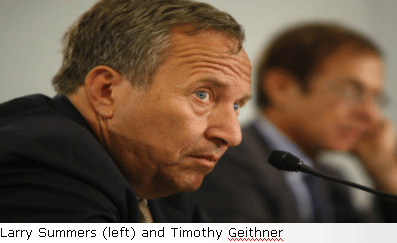
Larry Summers (left) and Timothy Geithner
At the time of writing, Obama's favorite is Larry Summers,
front-runner for the position of Treasury Secretary.
Harvard University Economics Professor Lawrence Summers served
as Chief Economist for the World Bank (1991–1993). He
contributed to shaping the macro-economic reforms imposed on
numerous indebted developing countries. The social and economic
impact of these reforms under the IMF-World Bank sponsored
structural adjustment program (SAP) were devastating, resulting
in mass poverty.
Larry Summer's stint at the World Bank coincided with the
collapse of the Soviet Union and the imposition of the IMF-World
Bank's deadly " economic medicine" on Eastern Europe, the former
Soviet republics and the Balkans.
In 1993, Summers moved to the US Treasury. He initially held the
position of Undersecretary of the Treasury for international
affairs and later Deputy Secretary. In liaison with his former
colleagues at the IMF and the World Bank, he played a key role
in crafting the economic "shock treatment" reform packages
imposed at the height of the 1997 Asian crisis on South Korea,
Thailand and Indonesia.
The bailout agreements negotiated with these three countries
were coordinated through Summers office at the Treasury in
liaison with the Federal Reserve Bank of New York and the
Washington based Bretton Woods institutions. Summers worked
closely with IMF Deputy Managing Director
Stanley Fischer, who was later appointed Governor of
the Central Bank of Israel.
Larry Summers became Treasury Secretary in July 1999. He is a
protégé of David Rockefeller. He was among the main architects
of the infamous Financial Services Modernization Act, which
provided legitimacy to inside trading and outright financial
manipulation.
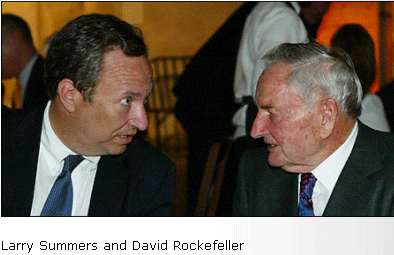
Larry Summers and David Rockefeller
"Putting the Fox in Charge of the Chicken Coop"
Summers is currently a Consultant to Goldman Sachs and managing
director of a Hedge fund, the
D.E. Shaw
Group, As former Treasury Secretary and his contacts
on Wall Street, Summers had valuable inside information on the
movement of financial markets. Under the helm of Larry Summers
and as a direct result of the financial meltdown, the D. E. Shaw
Group made record profits. At the end of October 2008, at the
height of the financial meltdown, the Shaw Group announced $7
billion in revenue, a 22 percent increase over the previous
year, "with nearly three times more cash on hand than a year
ago" (2theadvocate.com,
31 October 2008).
Putting a Hedge Fund manager (with links to the Wall Street
financial establishment) in charge of the Treasury is tantamount
to putting the fox in charge of the chicken coop.
The Washington Consensus
Summers, Geithner, Corzine, Volker, Fischer, Phil Gramm,
Bernanke, Hank Paulson, Rubin, not to mention Alan Greenspan, al
al. are buddies, they play golf together; they have links to the
Council on Foreign Relations and the Bilderberg; they act
concurrently in accordance with the interests of Wall Street;
they meet behind closed doors; they are on the same wave
length; they are Democrats and Republicans.
While they may disagree on some issues, they are firmly
committed to the Washington-Wall Street Consensus. They are
utterly ruthless in their management of economic and financial
processes. Their actions are profit driven. Outside of their
narrow interest in the "efficiency" of "markets", they have
little concern for "living human beings". How are people's lives
affected by the deadly gamut of macro-economic and financial
reforms, which is spearheading entire sectors of economic
activity into bankruptcy.
The economic reasoning underlying neoliberal economic discourse
is often cynical and contemptuous. In this regard, Lawrence
Summers' economic discourse stands out. He is known among
environmentalists for having proposed the dumping of toxic waste
in Third World countries, because people in poor countries have
shorter lives and the costs of labor are abysmally low, which
essentially means that the market value of people in the Third
World is much lower. According to summers, this makes it far
more "cost effective" to export toxic materials to impoverished
countries. A controversial 1991 World Bank memo signed by of
Chief Economist Larry Summers reads as follows (excerpts,
emphasis added):
DATE: December 12, 1991 TO: Distribution FR: Lawrence H. Summers
Subject: GEP
"'Dirty' Industries: Just between you and me, shouldn't the
World Bank be encouraging MORE migration of the dirty industries
to the Less Developed Countries?
I can think of three reasons:
1) The measurements of the costs of health impairing
pollution depends on the foregone earnings from increased
morbidity and mortality.... From this point of view a given
amount of health impairing pollution should be done in the
country with the lowest cost, which will be the country with the
lowest wages. I think the economic logic behind dumping a
load of toxic waste in the lowest wage country is impeccable and
we should face up to that.
2) The costs of pollution are likely to be non-linear as the
initial increments of pollution probably have very low cost.
I've always though that under-populated countries in Africa
are vastly UNDER-polluted, their air quality is probably
vastly inefficiently low compared to Los Angeles or Mexico City.
Only the lamentable facts that so much pollution is generated by
non-tradable industries (transport, electrical generation) and
that the unit transport costs of solid waste are so high prevent
world welfare enhancing trade in air pollution and waste.
3) The demand for a clean environment for aesthetic and
health reasons is likely to have very high income elasticity.
[the demand increases when income levels increase]. The concern
over an agent that causes a one in a million change in the odds
of prostrate cancer is obviously going to be much higher in a
country where people survive to get prostrate cancer than in a
country where under 5 mortality is is 200 per thousand.... "
http://www.globalpolicy.org/socecon/envronmt/summers.htm
Summers stance on the export of pollution to developing
countries had a marked impact on US environmental policy:
In 1994, "virtually every country in the world broke with Mr.
Summers' Harvard-trained "economic logic" ruminations about
dumping rich countries' poisons on their poorer neighbors, and
agreed to ban the export of hazardous wastes from OECD to
non-OECD [developing] countries under the Basel Convention. Five
years later, the United States is one of the few countries that
has yet to ratify the Basel Convention or the Basel Convention's
Ban Amendment on the export of hazardous wastes from OECD to
non-OECD countries. (Jim Valette, Larry
Summers' War Against the Earth, Counterpunch,
undated)
The 1997 Asian Crisis: Dress Rehearsal for Things to Come
In the course of 1997, currency speculation instrumented by
major financial institutions directed against Thailand,
Indonesia and South Korea was conducive to the collapse of
national currencies and the transfer of billions of dollars of
central bank reserves into private financial hands. Several
observers pointed to the deliberate manipulation of equity and
currency markets by investment banks and brokerage firms.
While the Asian bailout agreements were formally negotiated with
the IMF, the major Wall Street commercial banks (including
Chase, Bank of America, Citigroup and J. P. Morgan) as well as
the "big five" merchant banks (Goldman Sachs, Lehman Brothers,
Morgan Stanley and Salomon Smith Barney) were "consulted" on the
clauses to be included in the Asian bail-out agreements.
The US Treasury in liaison with Wall Street and the Bretton
Woods institutions played a central role in negotiating the
bailout agreements. Both Larry Summers and Timothy Geithner,
were actively involved on behalf of the US Treasury in the 1997
bailout of South Korea:
[In 1997] "Messrs. Summers and Geithner worked to persuade Mr.
Rubin to support financial aid to South Korea. Mr. Rubin was
wary of such a move, worrying that providing money to a country
in dire straits might be a losing proposition..." (WSJ, November
8, 2008)
What happened in Korea under advice from Deputy Treasury
Secretary Summers et al, had nothing to do with "financial
aid".
The country was literally ransacked. Undersecretary of the
Treasury David Lipton was sent to Seoul in early December 1997.
Secret negotiations were initiated. Washington had demanded the
firing of the Korean Finance Minister and the unconditional
acceptance of the IMF "bailout".
A new finance minister, who happened to be former IMF and World
Bank official, was appointed and immediately rushed off to
Washington for "consultations" with his former IMF colleague
Deputy Managing Director Stanley Fischer.
"The Korean Legislature had met in emergency sessions on
December 23. The final decision concerning the 57 billion dollar
deal took place the following day, on Christmas Eve December
24th, after office hours in New York. Wall Street’s top
financiers, from Chase Manhattan, Bank America, Citicorp and J.
P. Morgan had been called in for a meeting at the Federal
Reserve Bank of New York. Also at the Christmas Eve venue, were
representatives of the big five New York merchant banks
including Goldman Sachs, Lehman Brothers, Morgan Stanley and
Salomon Smith Barney. And at midnight on Christmas Eve, upon
receiving the green light from the banks, the IMF was allowed to
rush 10 billion dollars to Seoul to meet the avalanche of
maturing short-term debts.
The coffers of Korea’s central Bank had been ransacked.
Creditors and speculators were anxiously awaiting to collect the
loot. The same institutions which had earlier speculated against
the Korean won were cashing in on the IMF bailout money. It was
a scam. (See Michel Chossudovsky,
The
Recolonization of Korea, subsequently published as a
chapter in The Globalization of Poverty and the New World Order,
Global Research, Montreal, 2003.)
"Strong economic medicine" is the prescription of the Washington
Consensus. "Short term pain for long term gain" was the motto
at the World Bank during Lawrence Summers term of as World Bank
Chief Economist. (See
IMF, World Bank
Reforms Leave Poor Behind, Bank Economist Finds,
Bloomberg, November 7, 2000)
What we dealing with is an entire " old boys network" of
officials and advisers at the Treasury, the Federal Reserve, the
IMF, World Bank, the Washington Think Tanks, who are in
permanent liaison with leading financiers on Wall Street.
Whoever is chosen by Obama's Transition team will belong to the
Washington Consensus.
The 1999 Financial Services Modernization Act
What happened in October 1999 is crucial.
In the wake of lengthy negotiations behind closed doors, in the
Wall Street boardrooms, in which Larry Summers played a central
role, the regulatory restraints on Wall Street’s powerful
banking conglomerates were revoked "with a stroke of the pen".
Larry Summers worked closely with Senator
Phil Gramm (1985-2002),chairman of the Senate Banking
committee, who was the legislative architect of the the
Gramm-Leach-Bliley Financial Services Modernization Act, signed
into law on November 12, 1999 (See Group Photo above). (For
Complete text click US Congress:
Pub.L. 106-102).
As Texas Senator, Phil Gramm was closely associated with Enron.
In December 2000 at the very end of the Clinton mandate, Gramm
introduced a second piece of legislation, the so-called
Gramm-Lugar Commodity Futures Modernization Act, which paved the
way for the speculative onslaught in primary commodities
including oil and food staples.
"The act, he declared, would ensure that neither the sec nor the
Commodity Futures Trading Commission (cftc) got into the
business of regulating newfangled financial products called
swaps—and would thus "protect financial institutions from
overregulation" and "position our financial services industries
to be world leaders into the new century." (See David Corn,
Foreclosure Phil, Mother Jones, July August 2008)
Phil Gramm was McCain's first choice for Secretary of the
Treasury.
Under the FSMA new rules – ratified by the US Senate in October
1999 and approved by President Clinton – commercial banks,
brokerage firms, hedge funds, institutional investors, pension
funds and insurance companies could freely invest in each others
businesses as well as fully integrate their financial
operations.
A "global financial supermarket" had been created, setting the
stage for a massive concentration of financial power. One of
the key figures behind this project was Secretary of the
Treasury Larry Summers, in liaison with David Rockefeller.
Summers described the FSMA as "the legislative foundation of the
financial system of the 21th century". That legislative
foundation is among the main causes of the 2008 financial
meltdown.
Financial Disarmament
There can be no meaningful solution to the crisis, unless there
is a major reform in the financial architecture, implying inter
alia the freezing of speculative trade and the "disarming of
financial markets". The project of disarming financial markets
was first proposed by John Maynard Keynes in the 1940s as a
means to the establishment of a multipolar international
monetary system. (See J.M. Keynes, Activities 1940-1944,
Shaping the Post-War World: The Clearing Union, The
Collected Writings of John Maynard Keynes, Royal Economic
Society, Macmillan and Cambridge University Press, Vol. XXV,
London 1980, p. 57).
Main Street versus Wall Street
Where are Obama's "Main Street appointees"? Namely individuals
who respond to the interest of people across America. There are
no labor or community leaders on Obama's list for key
positions.
The President-elect is appointing the architects of financial
deregulation.
Meaningful financial reform cannot be adopted by officials
appointed by Wall Street and who act on behalf of Wall Street.
Those who set the financial system ablaze in 1999, have been
called back to turn out the fire.
The proposed "solution" to the crisis under the "bailout" is the
cause of further economic collapse.
There are no policy solutions on the horizon.
The banking conglomerates call the shots. They decide on the
composition of the Obama Cabinet. They also decide on the agenda
of the Washington Financial Summit (November 15, 2008) which is
slated to lay the groundwork for the establishment of a new
"global financial architecture".
The Wall Street blueprint has already been discussed behind
closed doors: the hidden agenda is to establish a unipolar
international monetary system, dominated by US financial power,
which in turn would be protected and secured by US military
superiority.
Neoliberal with a "Human Face"
There is no indication that Obama will break his ties to his
Wall Street sponsors, who largely funded his election campaign.
Goldman Sachs, J. P. Morgan Chase, Citigroup, Bill Gates'
Microsoft are among his main campaign contributors.
Warren Buffett, among the the world's richest individuals, not
only supported Barak Obama's election campaign, he is a member
of his transition team, which plays a key role deciding the
composition of Obama's cabinet.
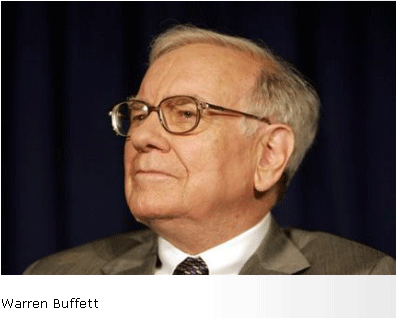
Warren Buffett
Unless there is a major upheaval in the system of political
appointments to key positions, an alternative Obama economic
agenda geared towards poverty alleviation and employment
creation is highly unlikely.
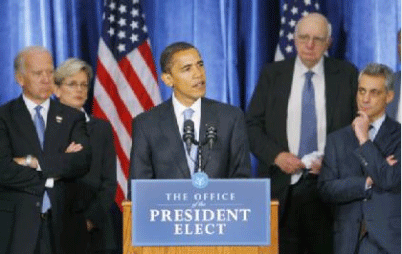
Barack
Obama. November 7 Press Conference.
Joe Biden (far left), newly appointed chief of staff Rahm
Emanuel (far right). Photo:
Charles Dharapak
What we are witnessing is continuity.
Obama provides a " human face" to the status quo. This human
face serves to mislead Americans on the nature of the economic
and political process.
The neoliberal economic reforms remain intact.
The substance of these reforms including the "bailout" of
America's largest financial institutions ultimately destroys
the real economy, while spearheading entire areas of
manufacturing and the services economy into bankruptcy.
|
The
Globalization of Poverty and the New World Order
by Michel Chossudovsky
| |
In this new and expanded edition of Chossudovsky’s
international best-seller, the author outlines the
contours of a New World Order which feeds on human
poverty and the destruction of the environment,
generates social apartheid, encourages racism and ethnic
strife and undermines the rights of women. |
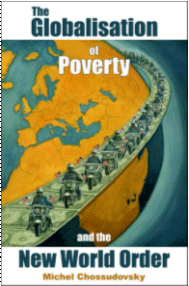
The result as his detailed examples from all parts of the
world show so convincingly, is a globalization of poverty.
This book is a skilful combination of lucid explanation and
cogently argued critique of the fundamental directions in
which our world is moving financially and economically.
In this new enlarged edition –which includes ten new
chapters and a new introduction-- the author reviews the
causes and consequences of famine in Sub-Saharan Africa, the
dramatic meltdown of financial markets, the demise of State
social programs and the devastation resulting from corporate
downsizing and trade liberalisation.
Michel
Chossudovsky is Professor of Economics at
the University of Ottawa and Director of the Centre for
Research on Globalization (CRG), which hosts the critically
acclaimed website
www.globalresearch.ca . He is a
contributor to the Encyclopedia Britannica. His writings
have been translated into more than 20 languages.
Published in 12 languages. More than 150,000 copies sold
Worldwide.
TO ORDER
CLICK HERE |
|
|
|
|